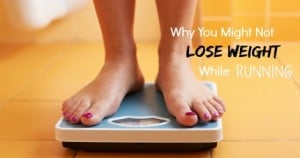How fast can a runner lose weight?
You know about racing weight, and maybe you’ve put on a few pounds over the holidays.
You know how to shape up your diet, but you’re probably still wondering something:
How long does it take to notice weight loss?
And how quickly can I lose weight before it becomes dangerous to my health?
Today, we are going to look at how long does it take to lose weight, what the safest recommendation for losing weight is, and how to start losing weight, regardless of whether you are running 1 mile a day, 2 miles, 3 miles, or even 10. If you are wondering how long to lose weight after a few too many cookies over the last few months or days off from an injury, this is where you need to be.
Can Running Everyday Help to Lose Weight?
While obesity and weight loss are hot research topics in the scientific world, studies on weight loss in runners in training are a bit less common.
Most research is limited to athletes who intentionally cut weight on a regular basis, like in combat sports with weight classes.
This can be unhelpful at times because these athletes are looking only to lose weight, however they can.
A distance runner is more concerned with specifically reducing body fat, ideally while maintaining lean muscle mass, and many runners even find they end up gaining weight during marathon training, which can be frustrating.
Most runners realize that this is a better alternative to being constantly injured, and without starving your body of the nutrition it needs to recover from that intense marathon training schedule, weight loss for runners is not always possible.
How long does it take to lose weight in a healthy way?
Research suggests that runners with excess body fat should consider losing weight to run faster, which is tough to do without sacrificing performance.
One important consideration in this process is how fast you should go about losing weight.
If, for example, you set a goal of losing ten pounds (about six percent of your body weight if you weigh 170 pounds), how fast can you or should you go about losing that weight?
According to scientific research, including a 2002 article by Janet Walberg Rankin at Virginia Tech University, the optimal rate of weight loss is somewhere around 1.1 to 2.2 pounds per week.
Consider this:
Losing weight too slowly prolongs the duration you have to spend in caloric deficit, which can impair your ability to recover from training.
On the other hand, losing weight too quickly induces fatigue and dehydration, and the risk of overtraining.
Now:
The range of 1.1 to 2.2 pounds per week is pretty broad.
Is one end of the spectrum better than the other?
Why is it better to lose weight slowly?
A study by Ina Garthe and other researchers at the Norwegian School of Sports Sciences took to examining just this question.
In their study, they split 36 elite Olympic sport athletes into two groups.
The first group set a goal of losing 0.7% of their body weight per week (which would correspond to a 1.2 pound loss per week in a 170 pound athlete), while the second group set a goal of losing twice this amount (1.4%).
Both groups received intensive nutritional counseling and were set on a weight-training plan to attempt to forestall any muscle mass losses.
Both groups also had the same overall weight loss goals, so the only difference was the rate at which they aimed to lose weight.
The athletes included in this study were already in heavy training (averaging 14 hours of training per week), so the groups focused on caloric restriction by keeping a food diary and using a food scale to follow the diet plans laid out by their nutritionists.
At the study’s conclusion, Garthe et al. studied the performance effects of the slow and the fast weight loss regimens.
The slower weight loss rate of 0.7% of body weight per week had a number of advantages.
The athletes were able to actually put on lean body mass.
The faster weight loss group didn’t lose any muscle mass, but despite their strength training, they didn’t put on any either.
It get’s better:
The slow weight loss group improved their countermovement jump (a measurement of explosive strength) and their bench press by a greater amount than the fast weight loss group.
However, there is a downside:
Since most athletes weren’t in endurance sports, there was unfortunately no evaluation of VO2max or any other endurance-specific variables, but the overall trend still favors slow weight loss–improvements in countermovement jump height are known to boost running economy, for example.
Nab Our FREE 4-part Weight Loss Email Course
You’ll learn the science behind losing weight and still running well so you can understand the “why” of weight loss for long-term success.
Lessons include why simply running more and eating less won’t help you lose weight, why your weight fluctuates each day, and the best way to distribute calories throughout your day. Plus more…
Start My Course Now
Why is losing weight fast so bad?
The fast weight loss group actually failed to reach their goal weight loss rate: the group as a whole only averaged 1.0% of body weight lost per week.
This is despite receiving an intensive nutrition coaching program.
Consider this:
The authors hypothesized that this might have been because their high caloric deficits (on the order of 1000 Calories per day below their energy expenditures) caused their body to rebel against the protocol, perhaps lowering their baseline metabolic rate and preventing the goal rate of weight loss.
In a follow-up study that tracked the athletes six and twelve months after the weight loss intervention, the authors found no differences in ability to keep weight off or maintain lean body mass.
What’s the bottom line?
Once you’ve lost the weight, the rate at which you lost it is not particularly important.
The optimal rate of weight loss for decreasing fat mass while maintaining or increasing lean body mass seems to be around 0.7% to 1% of your starting body weight per week.
According to Garthe et al., an approximate rule of thumb for weight loss is that every 1.1 pounds of weight lost per week is equivalent to a net energy deficit of 500 Calories per day, which can be accomplished by reducing caloric intake, increasing energy expenditure (through physical activity), or a combination of both.
This is important:
While losing weight, it’s also a good idea to do some kind of strength work, which Dr Jordan Santos explained in the recent podcast based on his research on runners.
This will help you keep your lean muscle mass (the source of your power) while decreasing your body fat (the stuff that slows you down).
How does diet affect weight loss
We already found out you cannot out run a bad diet, a big part of running for weight loss means eating the right foods too, not only for losing weight, but for your training and being able to perform.
Otherwise, you could find yourself injured or overtrained, which will require more eating to dig yourself out (and less exercise) while your body repairs.
What to eat after a run to lose weight is also important to consider:
Make sure you utilize the two optimal windows for recovery by eating foods with a 4:1 or 3:1 ratio of carbohydrates and protein.
Need some examples?
- 1 medium banana+ 2 Tablespoons Almond Butter
- 1/2 cup Greek yogurt + 1 cup Berries
- 1 medium Sweet potato + 4 oz salmon
- 1/2 can Tuna + 1/2 Avocado on Toast
- 2 Eggs + vegetables in a Pita
Following these guidelines, a 200-pound runner could aim to lose 1.4 to 2.0 pounds per week, which would require a deficit of 630 to 900 Calories per day.
To improve your odds of maintaining or increasing your performance, it’s probably best to stick to the lower end of this weight loss range.
It might take longer, and you’ll have to endure a longer stretch of dieting, but this is the optimal way for running faster.
[bctt tweet=”Finally! @Runners_Connect gives us an answer on how long to lose weight (in a healthy way!)” via=”no”]
The good news is that if you do diet more aggressively, losing closer to 1% of your body weight per week, the long-term effects don’t seem to be any different than a slower weight loss strategy.
If you are injured, this becomes a little tougher to help with your weight loss goals, but these 7 pool running workouts are sure to give your body the opportunity to rev up your metabolism, and as long as you continue to eat in a healthy way, you should still be able to lose weight, even if you aren’t running.




